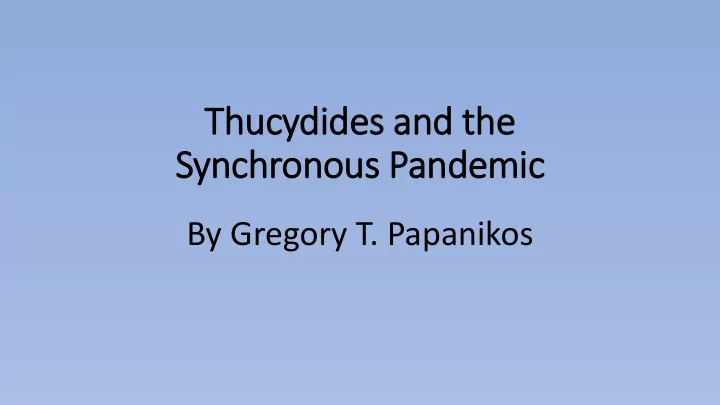

Thucydides and the Synchronous Pandemic By Gregory T. Papanikos
Some Stylized (H (His istorical) Facts about the Ancient Pla lague • Source: Thucydides The Peloponnesian War • Time of the Plague: 430-429 BCE and 427 BCE • Symptoms: Well known • Cause: Unknown • Deaths: Unknown (? 25% of the population) • Important People Survived: Thucydides • Important People Died: Pericles • Short term effects: Lethal-Very Contagious Disease • Long term Effects: None
The Thucydidian Hypotheses about Pandemics • H1: Blame it on Foreigners and Enemies • H2: An Epidemic has Different Individual Effects • H3: An Epidemic Gives Rise to Metaphysical Explanations • H4: An Epidemic has Social and Political Consequences
H1: : Blame it on Foreigners and Enemies I Where did it come from: 1. Barbarophones (Ethiopia, Upper Egypt-Sudan, Libya) 2. Lacedemonians (Sparta) Note: It seems to me that Thucydides did not accept any of these two allegations. He used the terms “as is said” (ὡς λέγεται) for those with a xenolalia and “was said” (ἐλέχθη ) for the Peloponnesians.
H1: : Blame it on Foreigners and Enemies II II I do believe that Thucydides did not adopt either explanation. Immediately in the next sentence, after he reported the two explanations, questioned both rumors. Thucydides wrote that everyone ( ὡς ἕκαστος ) said ( λεγέτω ) whatever he knew ( γιγνώσκει ) as logical or correct ( εἰκὸς ἦν ) which gave rise to this ( γενέσθαι αὐτό ). And these people included both physicians and ignorant ( καὶ ἰατρὸς καὶ ἰδιώτης ). He highlighted the ignorance of these epidemics, i.e., the speculation on the real causes of such diseases which in essence change the nature of things (καὶ τὰς αἰτίας ἅστινας νομίζει τοσαύτης μεταβολῆς ἱκανὰς εἶναι δύναμιν ἐς τὸ μεταστῆσαι σχεῖν).
H2: : An Epidemic has Dif ifferent In Individual Effects I • Both the symptoms of the disease differ as a well as their attitudes towards it. Some are infected and they had an easy way out; • Others suffer and even worst died from it. Doctors suffered the most and those who took care of those infected. • Thucydides mentioned that medicines which made some better off others were made worse off. Even the quality of health care did not help either. • Some were heroic and helped other and some run-away.
H2: : An Epidemic has Dif ifferent In Individual Effects II II • Some people were scared. They did not go near an infected person ( εἴτε γὰρ μὴ 'θέλοιεν δεδιότες ἀλλήλοις προσιέναι,) who was left abandoned (ἀπώλλυντο ἐρῆμοι). Others, on the other hand, had the virtue ( οἱ ἀρετῆς) and felt ashamed (αἰσχύνῃ ) to leave their friends to die alone. But worst of all ( δεινότατον δὲ παντὸς) was the effect on people’s mood (ἀθυμία) once they realized that they were infected. The result was hopelessness ( ἀνέλπιστον) which they could not stand (οὐκ ἀντεῖχον).
H3: : An Epidemic Giv ives Ris ise to Metaphysical Explanations • Two are mentioned by Thucydides 1. The first metaphysical explanation is based on an elegant story based on the spelling of two Greek words which phonetically sound the same: λιμός (famine) and λοιμός (plague). Thucydides wrote that the older Athenians remembered an old saying which stated that “a Dorian war will come along with a plague” (ἥξει Δωριακὸς πόλεμος καὶ λοιμὸς ἅμ' αὐτῷ). But Thucydides pointed out that the old saying was talking about λιμός (famine) and not about λοιμός (plague). 2. The Pythia told Lacedemonians that they would win the war if they fought with all their power ( εἰ χρὴ πολεμεῖν ἀνεῖλε κατὰ κράτος πολεμοῦσι νίκην ἔσεσθαι). And in such a case, Apollo would help them (καὶ αὐτὸς ἔφη ξυλλήψεσθαι). Thus Apollo sent the Plague.
H4: : An Epidemic has Socia ial and Poli litical Consequences • Pericles rule was challenged at least in the beginning. He was fined and was not elected strategos. But the next year he was elected again. • The Plague had very short term social and political effects and once it was over Athenians forgot about it. • The Plague played no role in the outcome of the Peloponnesian war.
Conclusions I Apart from some small differences, people and societies respond to epidemics and pandemics today in the same or in similar way as did the Ancient Athenians in 430 BCE. And while one might rightly think that a tremendous progress has been made in medical and pharmaceutical technology, the most fundamental problems remain the same when one compares the ancient Athenian epidemic with the current ecumenical pandemic.
Conclusions II II The social and political issues seem to be the same. As in the ancient epidemic so in the synchronous pandemic, some people and even head of states blame it on the foreigners. Some go so far as to argue that it is part of a biological war; similar to what some Athenians thought about their epidemic. Comparable are the reactions to social norms. Today, as in ancient Athens, people are dying alone and they are buried in mass graves. Some citizens blamed it on their politicians. Even the metaphysical explanations have not disappeared. In the synchronous pandemic, even the metaphysical explanations of God sending the disease to punish the sinful have been adopted by heads of states and religious leaders. It is interesting how similar does the world looks today to the one of ancient Athens. The only difference is in technology.
Conclusions III III After all these years, it seems only Prometheus has been working hard to change the material conditions. Unfortunately, philosophers and historians have not worked as hard to change people’s non -orthological explanations of ecumenical phenomena.
Recommend
More recommend